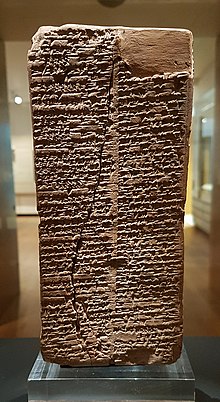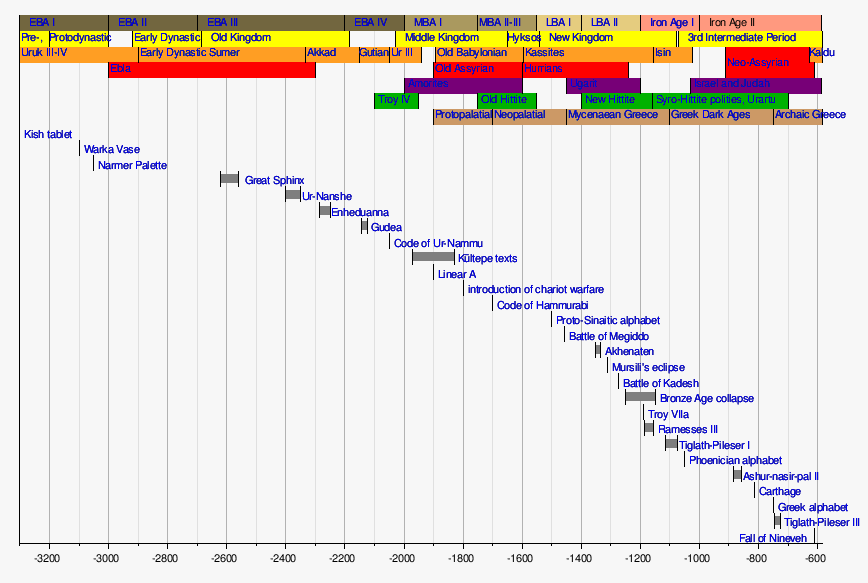

| Ziusudra 𒍣𒌓𒋤𒁺 | |
|---|---|
| King of Shuruppak King of Sumer | |

Sumerian King List, 1800 BC, Larsa, Iraq
| |
| Antediluvian king | |
| Reign | c. 2900 BCE |
| Predecessor | Ubara-tutu |
| Successor | Deluge Jushur of Kish |
| |
| Died | Immortal |
| Dynasty | Antediluvian |
| Father | Ubara-tutu (Akkadian tradition) |
Ziusudra (Old Babylonian Akkadian: 𒍣𒌓𒋤𒁺, romanized: Ṣíusudrá [ṣi₂-u₄-sud-ra₂], Neo-Assyrian Akkadian: 𒍣𒋤𒁕, romanized: Ṣísudda,[1] Ancient Greek: Ξίσουθρος, romanized: Xísouthros) of Shuruppak (c. 2900 BC) is listed in the WB-62 Sumerian King List recension as the last king of Sumer prior to the Great Flood. He is subsequently recorded as the hero of the Eridu Genesis and appears in the writings of Berossus as Xisuthros.[citation needed]
Ziusudra is one of several mythic characters who are protagonists of Near Eastern flood myths, including Atrahasis, Utnapishtim and the biblical Noah. Although each story displays its own distinctive features, many key story elements are common to two, three, or all four versions.[citation needed]
In the WB-62 Sumerian king list recension, Ziusudra, or Zin-Suddu of Shuruppak, is listed as son of the last king of Sumer before a great flood.[2] He is recorded as having reigned as both king and gudug priest for ten sars (periods of 3,600 years),[3] although this figure is probably a copyist error for ten years.[4] In this version, Ziusudra inherited rulership from his father Ubara-Tutu,[5] who ruled for ten sars.[6]
The lines following the mention of Ziusudra read:
Then the flood swept over. After the flood had swept over, and the kingship had descended from heaven, the kingship was in Kish.[7]
The city of Kish flourished in the Early Dynastic period soon after a river flood archaeologically attested by sedimentary strata at Shuruppak (modern Tell Fara), Uruk, Kish, and other sites, all of which have been radiocarbon dated to ca. 2900 BC.[8] Polychrome pottery from the Jemdet Nasr period (ca. 30th century BC), which immediately preceded the Early Dynastic I period, was discovered directly below the Shuruppak flood stratum.[8][9] Max Mallowan wrote that "we know from the Weld Blundell prism [i.e. WB-62] that at the time of the Flood, Ziusudra, the Sumerian Noah, was King of the city of Shuruppak where he received warning of the impending disaster. His role as a saviour agrees with that assigned to his counterpart Utnapishtim in the Gilgamesh Epic. ... both epigraphical and archaeological discovery give good grounds for believing that Ziusudra was a prehistoric ruler of a well-known historic city the site of which has been identified."[10]
That Ziusudra was a king from Shuruppak is supported by the Gilgamesh XI tablet, which makes reference to Utnapishtim (the Akkadian translation of the Sumerian name Ziusudra) with the epithet "man of Shuruppak" at line 23.[11]
The tale of Ziusudra is known from a single fragmentary tablet written in Sumerian, datable by its script to the 17th century BC (Old Babylonian Empire), and published in 1914 by Arno Poebel.[12] The first part deals with the creation of man and the animals and the founding of the first cities Eridu, Bad-tibira, Larak, Sippar, and Shuruppak. After a missing section in the tablet, we learn that the gods have decided to send a flood to destroy mankind. The god Enki (lord of the underworld sea of fresh water and Sumerian equivalent of Babylonian god Ea) warns Ziusudra, the ruler of Shuruppak, to build a large boat; the passage describing the directions for the boat is also lost. When the tablet resumes, it is describing the flood. A terrible storm raged for seven days, "the huge boat had been tossed about on the great waters," then Utu (Sun) appears and Ziusudra opens a window, prostrates himself, and sacrifices an ox and a sheep. After another break, the text resumes, the flood is apparently over, and Ziusudra is prostrating himself before An (Sky) and Enlil (Lordbreath), who give him "breath eternal" and take him to dwell in Dilmun. The remainder of the poem is lost.[13][failed verification]
The Epic of Ziusudra adds an element at lines 258–261 not found in other versions, that after the flood[14] "king Ziusudra ... they caused to dwell in the KUR Dilmun, the place where the sun rises". The Sumerian word "KUR" is an ambiguous word. Samuel Noah Kramer states that "its primary meanings is 'mountain' is attested by the fact that the sign used for it is actually a pictograph representing a mountain. From the meaning 'mountain' developed that of 'foreign land', since the mountainous countries bordering Sumer were a constant menace to its people. Kur also came to mean 'land' in general".[13] The last sentence can be translated as "In the mountain of crossing, the mountain of Dilmun, the place where the sun rises".[13]
A Sumerian document known as the Instructions of Shuruppak dated by Kramer to about 2600 BC, refers in a later version to Ziusudra. Kramer stated "Ziusudra had become a venerable figure in literary tradition by the middle of the third millennium B.C."[15]
Xisuthros (Ξίσουθρος) is a Hellenization of the Sumerian Ziusudra, known from the writings of Berossus, a priest of Bel in Babylon, on whom Alexander Polyhistor relied heavily for information on Mesopotamia. Among the interesting features of this version of the flood myth, are the identification, through interpretatio graeca, of the Sumerian god Enki with the Greek god Cronus, the father of Zeus; and the assertion that the reed boat constructed by Xisuthros survived, at least until Berossus' day, in the "Corcyrean Mountains" of Armenia. Xisuthros was listed as a king, the son of one Ardates, and to have reigned 18 saroi. One saros (shar in Akkadian) stands for 3600 and hence 18 saroi was translated as 64,800 years. A saroi or saros is an astrologolical term defined as 222 lunar months of 29.5 days or 18.5 lunar years equal to 17.93 solar years.
Ziusudra is also mentioned in other ancient literature, including The Death of Gilgamesh[16] and The Poem of Early Rulers,[17] and a late version of The Instructions of Shuruppak.[18]
| Preceded by | King of Sumer c. legendary or 2900 BC |
Succeeded by |
| EnsiofShuruppak c. legendary or 2900 BC |
City flooded according to legend |
|
Rulers in the Sumerian King List
| ||||||||||||||||||||||||||||||||||||||||||||||||||||||||
|---|---|---|---|---|---|---|---|---|---|---|---|---|---|---|---|---|---|---|---|---|---|---|---|---|---|---|---|---|---|---|---|---|---|---|---|---|---|---|---|---|---|---|---|---|---|---|---|---|---|---|---|---|---|---|---|---|
| ||||||||||||||||||||||||||||||||||||||||||||||||||||||||
|
Timeline of the Ancient Near East
| |
|---|---|
 | |
|
|
| ||
|---|---|---|
| Primordial beings |
| |
| Primary deities |
| |
| Other major deities |
| |
| Minor deities |
| |
| Demons, spirits, and monsters |
| |
| Mortal heroes |
| |